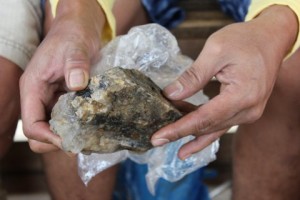
PRECIOUS
ROCK. Rocks that contain gold ores such as this are abundant in the
mountains of Davao region. (davaotoday.com photo by Medel V. Hernani)
By MARILOU AGUIRRE-TUBURAN
Davao Today
DAVAO CITY, Philippines – Anytime now, Malacañang will unveil its new mining policy, with a draft executive order aiming to increase taxes on mining firms and review existing contracts.
As Mindanao businessmen were quick to criticize the move saying this would hurt business, and Presidential spokesperson issuing a statement to allay these fears, just what is at stake for mining in the Davao region?
With the number of mining firms under exploration concessions, gold, nickel and copper in the mountains of Davao region continue to be up for grabs. But government earnings from the excise taxes paid by mining firms are small.
Apex Mining, one of only two mining firms in full operation in the region, contributed to government coffers only PHP 18.7 million (USD 0.44 million), in the first half of last year. The other firm, Holcim cement, was taxed even lesser, at PHP 1.2 million (USD 0.028 million) covering the same period.
Apex Mining has been mining the mountains of Maco town, Compostela Valley since the 1970s. It first ventured in copper mining but shifted to gold in the mid to late ‘70s when the prices of copper were decreasing while gold prices were soaring. In 2008, it was registered with the Board of Investments as a new producer of gold, silver bullion and copper concentrates with gold, silver, zinc and lead values on a non-pioneer status. All of its production is smelted in Switzerland.
Read More...
Courtesy of Davao Today
No comments:
Post a Comment